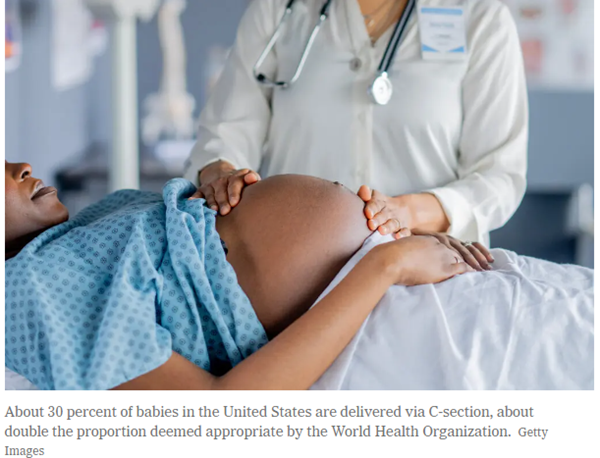Doctors Give Black Women Unneeded C-Sections to Fill Operating Rooms, Study Suggests
By Sarah Kliff
September 10, 2024
 Obstetricians are more likely to give Black women unnecessary cesarean sections, putting those women at higher risk for serious complications like ruptured surgical wounds.
Obstetricians are more likely to give Black women unnecessary cesarean sections, putting those women at higher risk for serious complications like ruptured surgical wounds.
That’s the conclusion of a new report of nearly one million births in 68 hospitals in New Jersey, one of the largest studies to tackle the subject.
Even if a Black mother and a white mother with similar medical histories saw the same doctor at the same hospital, the Black mother was about 20 percent more likely to have her baby via C-section, the study found.
The additional operations on Black patients were more likely to happen when hospitals had no scheduled C-sections, meaning their operating rooms were sitting empty. That suggests that racial bias paired with financial incentives played a role in doctors’ decision-making, the researchers said.
How that bias creeps in is not entirely clear. Doctors may rush to perform a C-section faster for Black women, worried about the well-known racial disparities in childbirth outcomes. Black women may feel less empowered to push back against the suggestion of C-section when their labor is not progressing — or, when they do push back, they may be less likely to have their concerns taken seriously.
“Physicians may have certain beliefs about Black women,” said Janet Currie, a health economist at Princeton University and a co-author of the study. “They might not be listening to Black women as much, or be more afraid that something will go wrong.”
C-section delivery is the most common surgery in American hospitals, despite years of advocacy to lessen its use. About 30 percent of babies in the United States are delivered this way, about double the proportion deemed appropriate by the World Health Organization. While the surgery can be lifesaving, unnecessary surgeries create a higher risk of complications for mothers, as well as higher medical bills.
In the new study, Dr. Currie and two other economists analyzed the medical records of more than 993,000 women who gave birth between 2008 and 2017. The team focused on women who came to the hospital in labor, excluding those who had scheduled C-sections.
They found that, overall, Black women were 25 percent more likely to have C-sections than white women were. Among women who arrived healthy and who had few risk factors, the gap was even larger, with Black women more than twice as likely to be given C-sections.
Medical records could not capture everything a doctor used to make medical decisions, the researchers said. Doctors might not always write down details that made Black women better candidates for surgical delivery.
Still, the data on the capacity of the hospital’s operating rooms points to explanations that are not medically justified.
When other women were occupying operating rooms with scheduled Cesarean deliveries, Black and white women had the same likelihood of being sent there for delivery.
“If Black moms are better candidates for C-section, then you should see them getting sent for C-section more even when there is limited capacity,” said Molly Schnell, an economist at Northwestern and one of the study authors.
The disparity emerged only when the operating rooms were empty. Then, 8 percent of healthy Black women wound up delivering by C-section compared with 4.8 percent of healthy white women.
“There is lots of evidence that if a hospital has a CT scan or an M.R.I. they like to…
[READ THE COMPLETE ARTICLE HERE]
